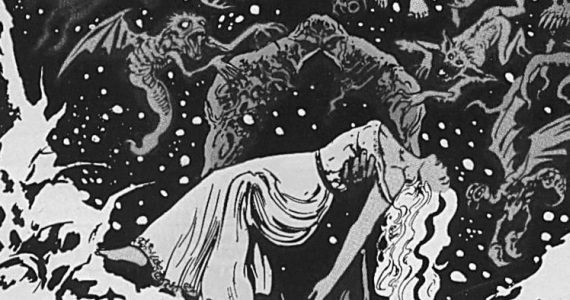Alan Moore has been an acclaimed writer for decades, celebrated for his ability to take comic book storytelling to unparalleled heights – while Moore left behind comics after years of dissatisfaction with the comic book industry, his belief in the medium of comic books as an art form not diminished.
In an interview with Games Radar, Moore discussed his story "What Can We Know About Thunderman?" from his Illuminations collection. The story deconstructs the superhero genre, tracing America's current cultural obsession through a large portion of the 20th century.
Despite his critical opposition toward the industry, Moore professed to hope that the story would make his love of comic storytelling clear, saying lovingly that, "the medium can do anything."
Alan Moore Pursued Comic Book Storytelling To Its Limits
Alan Moore is one of comics' most visionary, innovative writers – but according to his view of comics as a form of storytelling, it is less than he can do things others can't, and more that he is willing to take storytelling opportunities many others wouldn't. Moore would likely include his own work, including Watchmen, V for Vendetta, and his Swamp Thing run in DC in his assessment of the comic book medium, of which he told Games Radar that, "its potential is still almost completely untapped." With Swamp Thing in particular, Moore delightfully tested the outer boundaries of the medium, but few, if any, have dared to exceed him.
Alan Moore Sees Superheroes As A Danger To Comics
Part of Moore's deep apprehension about the comic book industry, and its recent exertion of great cultural influence through the success of superhero movies, is that he believes it could harm the medium in the long term, limiting comic book storytellers' ability to realize its full potential. The story "What Can We Know About Thunderman?" reflects these fears, meditating on the history of the industry and how it treats its creators and their creations, filtering all of this through Alan Moore's characteristic dense, polyphonic narrative style. "Thunderman" functions as both a love letter to the medium and a critical undermining of the superhero genre in particular.
"It was attempting to express my love of the medium, some of the wonderful people who worked in it," Moore says of one aim he had while writing "Thunderman," adding that another was, "to also express my horror at the fact that this little offshoot, the superhero genre, has become a monoculture that's in danger of taking down at least a considerable part of the comics medium." Moore fears this could happen "when superhero movies finally aren't interesting." Cultural interests operate in cycles – and while the past decade has seen the first Golden Age of Superhero Movies, in order for there to be a second, the current age must end.
"When that happens," Moore suggests, "my worry is that a lot of the comic shops won't be able to continue and a lot of interesting independent comics would perhaps not have outlets." As a believer in the limitless potential of comic book stories, Moore is understandably concerned about the future of his beloved art form. Like any prescient voice, he analyzes the past, present, and future of his medium, and like any good speculative writer, he is prone to forecasting dire possibilities. For current and future comic book creators, Alan Moore's words should serve as a challenge, prompting them to take the medium beyond limits its greatest author could not even conceive.
Source: Games Radar




